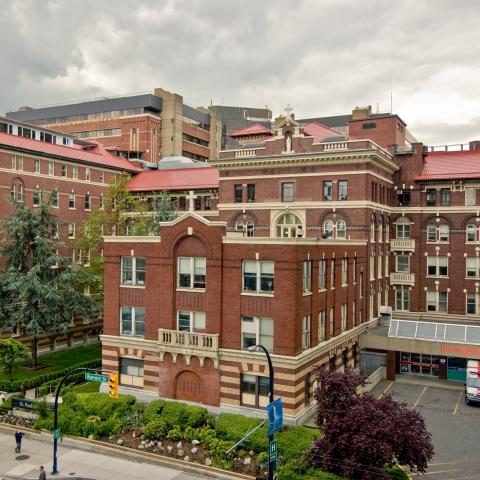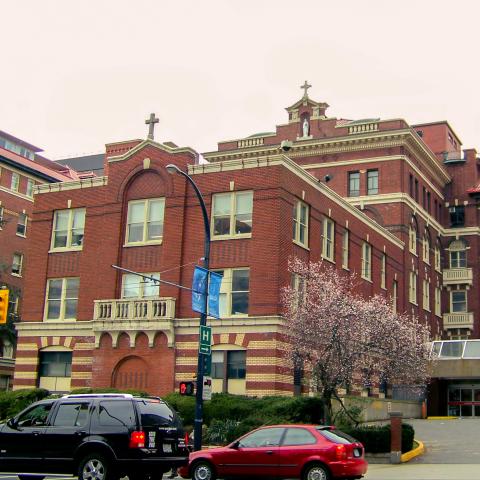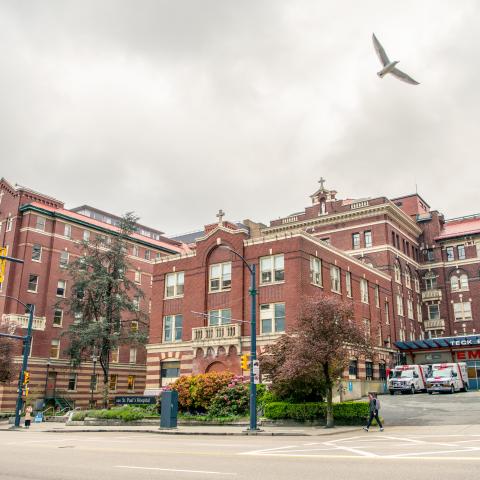Colorectal cancer
An overview of Providence Health Care’s services and resources for adults living with colorectal cancer.
Overview
Colorectal cancer is a type of cancer that starts in the large intestine. It is also called colon cancer or rectal cancer.
Colorectal cancer is the third most common cancer and the second most common cause of cancer deaths in Canada. If detected early, over 90% of cases are curable.
Colorectal cancer typically develops from polyps. Polyps are clusters of non-cancerous cells that can become cancerous over time. It usually takes 10 years for cancer to develop in a polyp.
Diagnosis & testing
We recommend adults aged 50 to 75 get regular colorectal cancer screening. If you are under 50 and have symptoms of colorectal cancer, you should also get screened. Colorectal cancer rates are rising among younger people.
Symptoms can include:
- Changes in bowel habits, such as constipation or diarrhea
- Bright red blood on toilet paper after wiping or in your stool
- Narrow stool
- Fatigue or anemia
- Sudden or unexplained weight loss
Do not hesitate to discuss your symptoms with your health care provider at Providence Health Care. Many people feel uncomfortable discussing their symptoms. Early detection is crucial for effective treatment and better outcomes.
Your health care provider will perform general physical and digital rectal exams. They will use a gloved finger to feel inside your rectum. They will be respectful of your boundaries and sensitivities throughout this exam.
Screening tests
The BC Cancer Agency provides a BC Colon Screening Program.
Your doctor will refer you to have your initial screening and follow-up screenings through the BC Colon Screening Program.
You will get a reminder from the program when you need a follow up screening. If you need a colonoscopy, the program also has patient navigator services to help you with the process.
Next, we will send you for screening tests. These will likely include:
If we find cancer in your colon or rectum, we will determine its stage.
Treatment & management
If you are diagnosed with colorectal cancer, surgery may be part of your treatment plan.
Most people with colorectal cancer get surgery before radiation or chemotherapy. People with some rectal cancers may get radiation or chemotherapy before their surgery.
Clinics that treat colorectal cancer
Surgery
We perform colorectal surgery at St. Paul’s Hospital.
St. Paul’s Hospital (SPH) is a centre of excellence in colorectal surgery. It is the only centre in British Columbia that performs certain colorectal procedures. SPH surgeons work with the BC Cancer Agency to provide state-of-the-art care.
Radiation & chemotherapy
You may also receive radiation and chemotherapy before or after your surgery. This depends on the extent of your cancer and whether it has spread outside your rectum. We might also recommend radiation and chemotherapy if we cannot do surgery on your tumour.
Hospice palliative care
If your cancer cannot be cured, we will work to give you the highest quality end-of-life care.
You are at the centre of this process. We will ask you for your care goals. These could be extending life, relieving pain, preventing bowel obstruction, treating anemia, or providing comfort. We will involve the appropriate physicians, which may include palliative care doctors.
At every step, we will strive to give you the best care in a sensitive and supportive manner.
Support services
Providence offers a variety of services to support those we care for. The following services may be of use or benefit to you and your families.
Support for Indigenous Peoples
The Indigenous Wellness Liaison Team is here to support your health journey. Team members offer cultural support and healthcare advocacy. Learn more below or call them at 604-682-2344,62937 or email IWL@providencehealth.bc.ca.
Education & resources
Patient education
Clinical trials & research
Advances in treatments for colorectal cancer are all thanks to medical research. While participating in research is a decision you should make in consultation with your care team, there is much activity in this field, so please ask us about our research programs if you’re interested.
By taking part in research, you can help us all learn more about heart disease and find better ways to help people like you live and thrive. While you cannot assume benefit to yourself, your participation can improve care for future patients.
The following clinical trials are currently enrolling volunteers. Please ask your care team for more information or contact the research team listed on each study or trial. For other information about research at Providence Health Care, please visit Providence Research.



